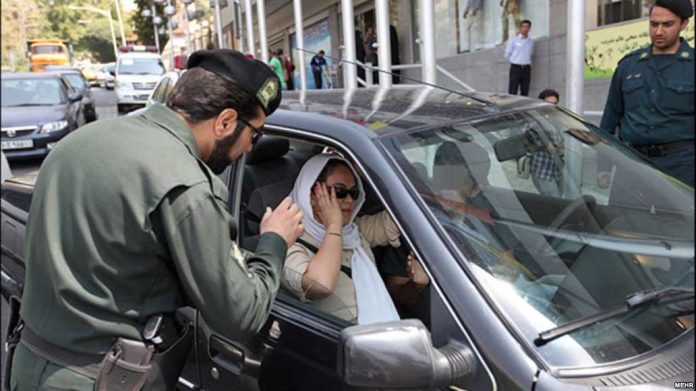By Kayhan Life Staff
The Islamic Republic of Iran is striving to pass the latest version of the “Hijab and Chastity Bill,” which has been drafted by the government and the Judiciary and has been submitted to the Majlis (Iranian Parliament) on June 13 for debate.
If passed, the measure will give greater and more independent powers to FARAJA — the Law Enforcement Command of the Islamic Republic of Iran — to fine “hijab violators” without consulting the Judiciary. The bill also goes into detail as to what constitutes “inappropriate” attire in the enforcement of the mandatory hijab.
If passed, the bill could also encourage citizens to engage in vigilante justice, offering legal immunity to “anyone who acts for any reason within the framework of promoting good.” This could potentially be the source of social tensions and unrest.
[aesop_image img=”https://kayhanlife.com/wp-content/uploads/2023/06/2023-06-08T000000Z_627248946_MT1NURPHO000641HJX_RTRMADP_3_DAILY-LIFE-IRAN.jpg” panorama=”off” credit=”Two Iranian women walk along a street-side in the strong winds without wearing the mandatory Islamic headscarf in downtown Tehran,on June 8, 2023. REUTERS./” align=”center” lightbox=”on” captionsrc=”custom” captionposition=”left” revealfx=”off” overlay_revealfx=”off”]
This is one of the brave girls of Iran who continues the fight against the clerical regime and ruling mullahs. Writing on the wall, she is inviting people to continue to strike and protest. The Islamic Republic has no chance against the young generation…especially the brave… pic.twitter.com/IOAGsvPj9s
— Masih Alinejad 🏳️ (@AlinejadMasih) June 19, 2023
U.S. Weighs Sanctions for Chinese Companies Over Tehran Surveillance Buildup – WSJ
In a video published recently, Hassan Mofkhami, the police chief of the northern province of Mazandaran, appeared to approve of citizens taking the law into their own hands to prevent others from protesting.
Appearing on the Babolsar Emrooz Instagram news channel on June 15, Commander Mofkhami said: “If, God forbid, someone should commit a disruptive act in this province, and in our cities, go ahead and break their neck in accordance with the law, and I will answer for it.”
"Break the neck of anyone who may seek to break the [hijab] norms, and I'll take responsibility for it," Hassan Mofakhami, the Police chief of Iran's Mazandaran province, told his subordinates during a visit to Babolsar beach. Iranian women who protest against the mandatory hijab… pic.twitter.com/CkgWRbj6oN
— Masih Alinejad 🏳️ (@AlinejadMasih) June 16, 2023
Kayhan London republished the video clip in a tweet on June 16, showing Commander Mofkhami making the remarks while speaking to reporters and other police officers during an inspection of the Babolsar shoreline.
The day before, Brigadier-General Ahmad Reza Radan, the commander of FARAJA, unveiled a plan to increase the number of cameras to monitor “hijab violators” while visiting the holy city of Qom, the capital of the northern province of Qom, 150 kilometers southwest of Tehran.
Radan told reporters: “President [Ebrahim Raisi] has approved the measure. We hope to get the funding for this [project] soon, so we can get the best use of smart [technology] in every aspect of security operations.”
“Cameras are currently used to monitor and identify hijab violators,” the semi-official Fars news agency quoted General Radan, saying. “First-time violators receive a text warning, and repeat offenders will be referred to the police and the Judiciary.”
“We will also implement the same plan on Mazandaran’s coastline, giving in-person warnings and sending text messages to violators,” he added.
“Police have a special plan to monitor public disturbances in the northern provinces’ coastline,” General Radan had said a week earlier during a meeting with Ayatollah Mohammad-Bagher Mohammadi-Laeini, the representative of Iran’s Supreme Leader Ayatollah Ali Khamenei in Mazandaran Province.
Iranian Chess Player in Exile Has No Regrets About Removing Hijab
The previous version of the “Hijab and Chastity Law,” a draft bill debated by the Majlis in March, called for imposing stiffer penalties on women who do not respect the mandatory hijab.
It called for canceling the passports and driving licenses of hijab violators and fining them between 500,000 tomans ($9.86) and 3 billion tomans ($58,000). (The conversions are based on the March 2023 exchange rate.)
The measure was implemented on April 15, allowing thousands of cameras to be installed in city streets nationwide. Shortly afterward, the government shut down businesses in a number of provinces.
[aesop_image img=”https://kayhanlife.com/wp-content/uploads/2023/06/2023-06-07T000000Z_967607475_MT1NURPHO000DWB254_RTRMADP_3_IRAN-HYPERSONIC-MISSILE.jpg” panorama=”off” credit=”Two Iranian women walk past an anti-Israel mural under a giant image of Fattah, Iran’s first-ever hypersonic missile, in Palestine square in downtown Tehran, June 7, 2023. According to Iran’s state media, the Fattah solid fuel hypersonic missile can reach Tel Aviv in 400 seconds from inside Iran and travels at a speed of 5,145 meters per second. REUTERS./” align=”center” lightbox=”on” captionsrc=”custom” captionposition=”left” revealfx=”off” overlay_revealfx=”off”]
The proposed new bill stipulates: “FARAJA will fine first and second-time offenders, respectively, one-sixth and one-third of the maximum amount listed in the Class-8 penalty table.”
“Repeat offenders must pay half of the maximum fine listed in the Class-8 penalty table. Their case may be referred to the Judiciary, and they must pay the fine listed in the Class-7 penalty table,” it added.
“First-time violators, who do not cover their bare skin or wear see-through shirts or tight outfits in public places or on social media posts, will be fined the maximum amount listed in the Class-7 penalty table,” the bill warned.
“Besides having to pay the said fine, repeat offenders will be prosecuted by the Judiciary and may also have to pay the maximum fine listed in the Class-6 penalty table and lose their social rights,” it explained.
Class-6 penalty includes a custodial sentence of six months to three years. The draft bill also mentioned Class-6 felony, which includes offenses like “pick-pocketing,” “purse snatching,” and “setting fire to other people’s homes and belongings,” which carries a mandatory prison sentence of two to five years.
According to Ahmad Rastineh, the spokesperson for the Majlis’ Cultural Commission, the “Promoting a Culture of Hijab and Chastity” bill calls for the use of “artificial intelligence” (AI) to monitor and identify “hijab violators.”
“We cannot resolve ‘hijab removal’ in the country by criminalizing it,” Mr. Rastineh said recently. “To address it, we must methodically enforce the Supreme Council of the Cultural Revolution’s guidelines on cultural persuasion, education, and evolution.”
“Anyone not upholding hijab [the dress code] violates the law. Officials and authorities must hold anyone who breaks the law accountable,” he argued.
“The ‘Hijab and Chastity Bill’ calls for regulating the use of artificial intelligence and electronic equipment to enforce the law,” Mr. Rastineh explained.
“There are some problems with the bill; namely, that it will not work as a deterrent because it does not reaffirm Article 638 of the Islamic Republic Penal Code, which classifies ‘removal of hijab’ as an offense and the Constitution’s Article on Chaste Life,” he added.
The Fars news agency published a video on June 14 that reportedly showed police using AI to identify women who do not cover their heads.
“These pictures were recorded recently in Valiye Asr Street in Tehran,” Fars said. “Police officers took pictures of women not wearing hijab and identified them using AI. Charges have been filed against some people and they have been referred to the Judiciary.”
Ali Akbar Zarei, the managing director of the Qom Province Department of Immigration and Foreign Nationals, recently revealed a plan to deport foreign nationals who do not observe the strict Islamic dress code.
“All hijab violators will be confronted,” Mr. Zarei said. “Afghan nationals could be deported from the country.”
Zarei also warned that foreign nationals in Iran could be denied social services if they do not adhere to the Islamic dress code.
“God has ordained the hijab,” Reza Ezzat-Zamani, deputy director for cultural affairs at the Islamic Development Organization, said recently. “No one can ignore God’s will.”
“The Iranian authorities must enforce God’s will,” Mr. Ezzat-Zamani argued. “However, we must be mindful of our society’s current struggle. We can solve many problems if we could make a girl who removes her hijab understand that she and we have the same enemy, i.e., the person who removed her headscarf is the same who knocked off turbans.”
Comments like these are a sign that Islamic Republic officials are out of touch with the younger generation of Iranians and the prevailing realities in the country. They do not understand the ideas behind “removing scarves” and “knocking turbans.”
In an interview with the Fars news agency on June 7, Fereshteh Rouhafza, a university professor and researcher on women and family, said: “It is wrong to suggest that we should back down from enforcing the hijab law because we did not deal with the satellite issue forcefully in the past.”
“Satellite was a device, and the same goes for video footage,” Ms. Rouhafza argued. “Both could be used positively. Inappropriate hijab, absence of hijab, and cultural disintegration are consequences of our failure and unwillingness to deal with the negative and corrupt consequences of the satellite.”
“Law and devices vastly differ,” Ms. Rouhafza explained. “It is wrong to conclude that we should compromise the law because we failed to deal with devices. Our inability to act effectively in the past does not justify our failure to act correctly today.”
“Our actions are guided by Islam and religion. Imagine what would happen if we did not enforce the hijab law, like when we failed to ban videos and satellites,” she warned. “Should we then relax laws on drinking alcohol?”
“Upholding the hijab law is not hypocritical, but guarantees other people’s rights,” she added. “No one bothers a person who uses drugs in the privacy of their home, but it would be problematic if they do it in public.”
Iranian Protesters Remain Defiant in the Face of Violent and Brutal Regime Oppression








